Denemek ALTIN - Özgür
Sunflower production: threatened by stink bugs and fungi
Farmer's Weekly
|December 08, 2023
With continuous management of the insects that predate on sunflowers, significant success can be attained with this crop, which is suited to growing in the drier parts of South Africa

As marginal cropping and low-input farming grow, sunflowers are gaining recognition as a suitable crop to cultivate rotationally with maize. Producers in dryland producing regions find sunflowers appealing due to their general drought tolerance and capacity to provide relatively constant harvests under adverse weather conditions and promising income due to sunflower oil’s application in food preparation, biofuel production, and cosmetics and skin care products. Sunflower flour and cake are fed to animals and the seeds are used for bird seed and human consumption.
However, sunflower production is challenged by various insect pests. The sporadic occurrence of the false chinch bug (Nysius natalensis) and the disease sclerotinia head and/or stalk rot, caused by the fungus Sclerotinia sclerotiorum, plays a role in the decline of sunflower plantings.
In South Africa, the region between 24°S and 30°S is the primary growing region for sunflowers. Up to 80% of the country’s sunflower production occurs in regions that have a semi-arid environment with variable and infrequent rainfall, low humidity and intense summertime sun radiation.
In the eastern highveld districts of Mpumalanga and the eastern portions of the Free State, the crop is often sown between November and December.
In the western regions of the Free State and North West, planting dates might be extended until mid-January; in the northern portion of the production area, planting takes place in January and February.
The northern region’s late planting date is determined by the area’s late rainfall.
Sunflower planting is frequently delayed past the customary dates by delayed spring rains throughout the whole summer rainfall area.
Bu hikaye Farmer's Weekly dergisinin December 08, 2023 baskısından alınmıştır.
Binlerce özenle seçilmiş premium hikayeye ve 9.000'den fazla dergi ve gazeteye erişmek için Magzter GOLD'a abone olun.
Zaten abone misiniz? Oturum aç
Farmer's Weekly'den DAHA FAZLA HİKAYE

Farmer's Weekly
Pastry delights and cupcakes
The versatility of pastry in baking and cooking is best flaunted by two vastly different recipes appealing to the sweet and savoury tooth, while a novel way to bake those Christmas-themed cupcakes will also go down well.
4 mins
December 5-12, 2025
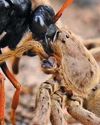
Farmer's Weekly
Specialised spider-hunting wasps
Wasps are apex predators of the insect world and have developed many survival strategies. One group of wasps focuses on hunting spiders to provide a source of food for their larval offspring
2 mins
December 5-12, 2025
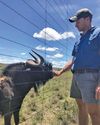
Farmer's Weekly
From bulls to boardrooms: farming part-time as a professional
Maintaining a farm requires time, resources, and commitment. Farming part-time while being fully employed elsewhere can seem daunting and risky. Although it certainly presents unique challenges, it is feasible for some. Koot Klopper and Herman van Heerden spoke to Henning Naudé about how excellent time management and the delegation of resources, as part-time farmers, successfully keep their farms productive.
5 mins
December 5-12, 2025

Farmer's Weekly
Holy Shiitake: mastering the science of gourmet fungi
Mushroom production is inherently the practice of expanding mycelium. But since wanted and unwanted fungi flourish under the same circumstances, a mushroom farmer's biggest challenge is ensuring the right fungi prevails. Lindi Botha reports on Rory Brooks' learning curve.
9 mins
December 5-12, 2025
Farmer's Weekly
No more 'secret' price hikes?
'Secret' electricity price hikes in South Africa have been curbed in a game-changing court ruling, explains Felix Dube, lecturer in the Department of Law at the University of Venda.
4 mins
December 5-12, 2025
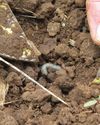
Farmer's Weekly
The cutworm scourge, and how to control it
The dominant cutworm, Agrotis segetum, is causing renewed, costly damage to South African maize, soya bean, and sunflower.
5 mins
December 5-12, 2025
Farmer's Weekly
Legislative gap requires a rethink on biosecurity controls
Since the dawn of democracy, the agriculture sector has cemented its place as one of the essential and trusted pillars for economic growth, job creation, and foreign earnings in South Africa.
2 mins
December 5-12, 2025

Farmer's Weekly
From kitchen experiments to a thriving meat empire
What started as an after-hours kitchen project in the Truter household has grown into the fully fledged meat empire Deli-Co. Brothers Pieter and Hendri Truter told Glenneis Kriel how they turned a local favourite into a multigenerational family business.
7 mins
December 5-12, 2025
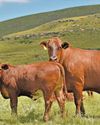
Farmer's Weekly
Brushing up on your 'cow speak'
Experienced stockman and cattle judge Willie de Jager spoke to Sabrina Dean about some of the basics of reading cattle behaviour and how best to handle these animals.
8 mins
December 5-12, 2025
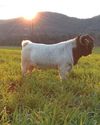
Farmer's Weekly
Corporate day job fuels farming dream
Marius Smit lives in the middle of Gauteng in Centurion and spends his workdays in the fast-paced high-stress corporate sector as a group forensic head for Discovery.
5 mins
December 5-12, 2025
Translate
Change font size

